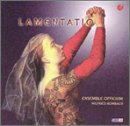| All Artists: Ycart, Isaac, Josquin, Rombach, Ens Officium Title: Lamentatio: Music for Passiontide Ca 1500 Members Wishing: 0 Total Copies: 0 Label: Christophorus Release Date: 11/26/2002 Album Type: Import Genre: Classical Styles: Opera & Classical Vocal, Historical Periods, Early Music Number of Discs: 1 SwapaCD Credits: 1 UPC: 675754558826 |
Search - Ycart, Isaac, Josquin :: Lamentatio: Music for Passiontide Ca 1500
 | Ycart, Isaac, Josquin Lamentatio: Music for Passiontide Ca 1500 Genre: Classical
|
Larger Image |
CD DetailsSimilar CDs
|
CD ReviewsA grand panorama of the Renaissance Sator | Sydney, Australia | 06/16/2005 (5 out of 5 stars) "Leonardo da Vinci (1452 - 1519), Heinrich Isaac (c.1450 - 1517) and Josquin des Prez (c.1440 - 1521) were all contemporaries of each other. Leonardo's reknown amongst his contemporaries was based as much on his musical abilities as those in any other field and he is known to have been familiar with the compositions of Josquin and Isaac. While Josquin was to continue to be hailed as the Michelangelo of music for centuries after his death before succumbing to the same lapse into obscurity as Isaac, prosperity has been kinder to Leonardo. Perhaps if Leonardo's 'Treatise on Music', referred to in his writings but lost, had survived maybe the revival of the reputations of his musical contemporaries might have happened sooner, for this was an age in which music flourished as much as painting. The polyphonic complexity of music reached a zenith in this age that has never since been equalled. Heinrich Isaac is one of the few composers of what is often known as the Prima Prattica (First Practice),who were widely put on parr with Josquin amongst the remarkable number of inspired composers of this period. Comparisons between Josquin and Isaac are endlessly fascinating. Josquin's music seems darker, quirkier and more melancholic. Isaac's music seems to have a grander sweep and solemn nobility. Isaac tends to prefer writing for six parts while Josquin generally chooses four. The comparison to the Handel-Bach pairing has been suggested, but it is just as equally possible to compare them to other pairs such as Wagner-Brahms, Haydn-Mozart, or even Stravinsky-Schoenberg, with each comparison having its particular limitations. In Bach's time, Telemann was universally lauded as the greatest composer of the times - a fact quoted today with a certain ridicule and exasperation. Josquin too was lauded as the greatest of his time, but for some strange reason until recently this has been accepted as though it were holy writ. Today more scholars question this and today we are seeing a number of other composers of the Prima Prattica being proposed as the 'true' neglected genius of the time. For some it is Obrecht, for others de la Rue, but whoever your favoured one may be, this was an age with an astonishing abundance of remarkable composers. Not a year seems to go by without someone rediscovering some new remarkable voice - Antoine Busnoys (c.1430 - 1492), Matthaeus Piperlare (c.1450 - c.1515), Antoine Brumel (c.1460 -c.1520), Nicholas Gombert (c.1490 - 1556), and Alexander Agricola (1446 - 1506) all are great candidates for justly deserved adulation. That is an embarrassment of riches indeed. In such a climate, it is hardly surprising that yet another composer of interest such as Berhard Ycart, about whom little is known except that he lived in the latter half of the 16th century, should crop up as it does on this CD. His Lamentationes Hieremiae Prophetae here receive their world premier recording. David Vernier, writing for ClassicsToday online, wrote on the Ensemble Officium's performance of Palestrina that: "Although the Tallis Scholars remain the world's premier Palestrina performers, if forced to make such comparisons I'd without reservation say that Ensemble Officium is very close behind. I look forward to hearing more--much more--from this excellent group." That is just praise indeed and if this CD is anything to go by we can expect even greater things to come from this bright young German group. The performances here of Isaac, Josquin and Ycart are superb and are strongly recommended." Great Music, Great Singing Giordano Bruno | Wherever I am, I am. | 06/29/2007 (5 out of 5 stars) "Johji Josquin, who reviewed this CD two years ago, was right to heap praises on it, though to call it a panorama seems odd. It's a very focused performance of music for "Passiontide". It's somber, not mournful but certainly not cheerful, and hardly reflects the many moods of Renaissance vocal music, which is all to its credit. If you wish to hear music as spiritual, rather than architectural, you will adore this selection. (Personally, I'm rather less well disposed toward religion as such than Christopher Hitchens or Richard Dawkins, but I adore it too.)
Heinrich Isaac's "Choralis Constantinus" is one of the last GREAT bodies of Renaissance polyphony that hasn't been mined for performance and recording. The small segment included on this disk is enough to make one crave a boxed set of the whole. The motet "Miserere mei Deus" by Josquin des Prez is one of his most expressive, and the "Lamentationes" by the nearly unknown composer Bernhard Ycart demonstrates once again that we've probably lost more splendid music than we've saved. The whole program suits the talents of Ensemble Officium perfectly. The choir of 12 is too large to render rhythmically complex polyphony in a clear and eloquent fashion, but on these delicately restrained laments, their rich timbres are a joy to the ear." |

 Track Listings (12) - Disc #1
Track Listings (12) - Disc #1